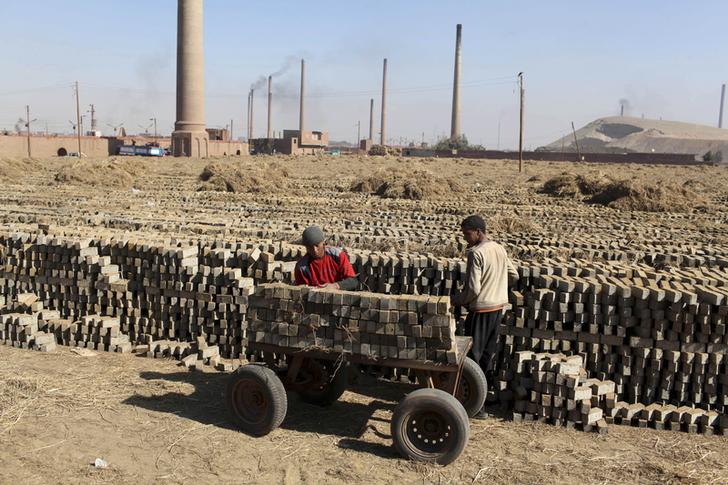Latest NEWS
- Aswat Masriya, the last word
- Roundup of Egypt's press headlines on March 15, 2017
- Roundup of Egypt's press headlines on March 14, 2017
- Former Egyptian President Hosni Mubarak to be released: lawyer
- Roundup of Egypt's press headlines on March 13, 2017
- Egypt's capital set to grow by half a million in 2017
- Egypt's wheat reserves to double with start of harvest -supply min
- Roundup of Egypt's press headlines on March 12, 2017
Egyptian rights organizations warn government against coal usage

Brick layers works at a brick factory on the outskirts of Giza governorate January 20, 2013. REUTERS/Asmaa Waguih
By Nayrouz Talaat
After the Egyptian government recently announced its intent to import coal as an alternative source of energy, a number of rights organizations issued a warning statement condemning such intent.
The warning came after the government called on local plants of energy-intensive industry to use coal because of the continuous shortage in gas and electricity supply in Egypt.
"In terms of environmental and economic realms, the government’s decision neglects dangerous pollutants and greenhouse gas emissions resulting from the burning of coal, and the magnitude of hazardous pollutants and radiation as the main cause for diseases and health risks worsened for incinerator workers or residents in the surrounding area," Hoda Baraka of Green Peace International Organization said.
According to statements published recently in local press, the Ministry of Industry plans to transform existing and planned cement plants to rely on coal. It would also expand towards converting energy-intensive industry sectors towards coal. It also intends to run three power plants under construction on coal.
The organizations that signed on the warning statement include the Egyptian Initiative for Personal Rights (EIPR), Greenpeace, 350.org, the Arab Youth Climate Movement (AYCM), the Egyptian Center for Economic and Social Rights (ECESR), the Hurghada Environmental Protection and Conservation Association (HEPCA), the Nature Conservation Egypt (NCE) , the Green Arm - Nahdet Al Mahrousa, the Egypt National Climate Change Coalition (ENCCC), Dayma and the Association for Health and Environmental Development (AHED).
Signing this statement strongly emphasizes the adverse effects of coal usage on more than one level, according to rights organizations.
"There is also a disregard for the harm caused by coal-run plants on soil and water quality in the areas exposed to the emitted pollutants. Not to mention the cost of dealing with thousands of tons of solid waste generated from burning coal, which is waste containing several extremely hazardous substances," Baraka added.
On the business sector, the idea is totally welcomed by business owners who find coal usage the only alternative to the current daily losses in plants production.
The current big deficit in power supply caused 20 percent losses in strategic industry of cement capacity production, 3.7 tonnes (1.3 billion Egyptian pounds) during the past four months, said Jose Maria Magrina, Chief Executive Officer of the Arabian Cement Company (ACC).
On the other hand, environment experts said that the Egyptian government's trend (tendency) to rely on imported energy sources lacks any clear logic in light of Egypt's rich natural renewable sources for energy production.
"We have not heard about the expansion of investments related to energy generation from wind and solar energy sources, areas where Egypt has a comparative advantage," environment experts said.
The warning statement said that the actions have been inherited from the era of Mubarak as policies seeking to maximize the value of investment alongside rapid returns, without the slightest regard for sustainability or taking notice of the environmental impacts caused by these policies, which result in severely burdening the current and future generations.
According to signatory organizations, the government supports switching to coal to reduce power consumption in cement factories, which are already subsidized by the government and do not need any more subsidies compared to other private companies in the market. Private companies are not subsidized since they are responsible for the cost of switching to coal.
This is a crime of great proportions against the Egyptian society's present and future generations.
Before the fuel crisis, the Egyptian government encouraged plants in 2010 to use natural gas as an alternative energy source. But the current escalation in the fuel crisis led the government to switch to other energy sources such as coal, a trend that widely spread worldwide in countries such as China and the United States who are the biggest coal consumers.
A research that was published last November suggested that 1,000 new coal-fired power plants are planned worldwide, with 363 in China and 455 in India. If all the plants were built, it would put the world on "a really dangerous trajectory" for climate change, experts at the World Resources Institute said.










